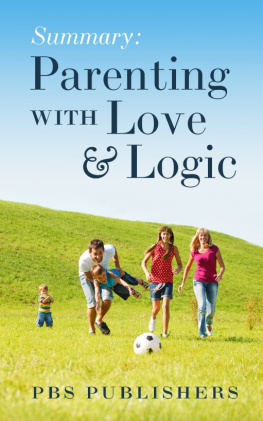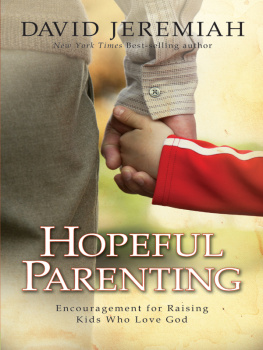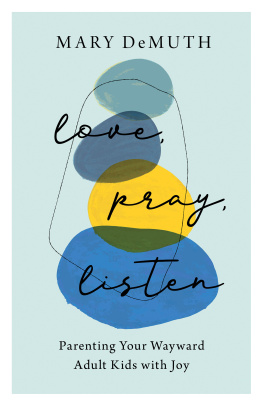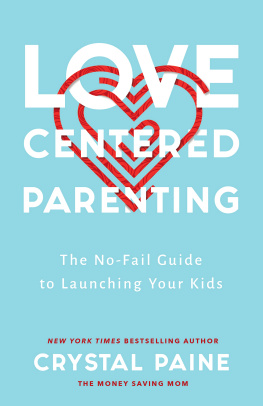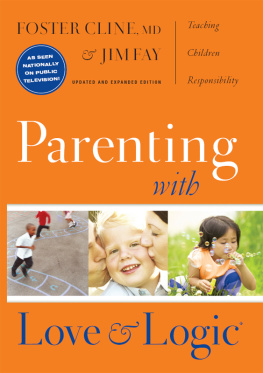PBS Publishers - Summary Parenting with Love and Logic
Here you can read online PBS Publishers - Summary Parenting with Love and Logic full text of the book (entire story) in english for free. Download pdf and epub, get meaning, cover and reviews about this ebook. year: 2013, publisher: PBS Publishers, genre: Home and family. Description of the work, (preface) as well as reviews are available. Best literature library LitArk.com created for fans of good reading and offers a wide selection of genres:
Romance novel
Science fiction
Adventure
Detective
Science
History
Home and family
Prose
Art
Politics
Computer
Non-fiction
Religion
Business
Children
Humor
Choose a favorite category and find really read worthwhile books. Enjoy immersion in the world of imagination, feel the emotions of the characters or learn something new for yourself, make an fascinating discovery.
- Book:Summary Parenting with Love and Logic
- Author:
- Publisher:PBS Publishers
- Genre:
- Year:2013
- Rating:3 / 5
- Favourites:Add to favourites
- Your mark:
- 60
- 1
- 2
- 3
- 4
- 5
Summary Parenting with Love and Logic: summary, description and annotation
We offer to read an annotation, description, summary or preface (depends on what the author of the book "Summary Parenting with Love and Logic" wrote himself). If you haven't found the necessary information about the book — write in the comments, we will try to find it.
Summary Parenting with Love and Logic — read online for free the complete book (whole text) full work
Below is the text of the book, divided by pages. System saving the place of the last page read, allows you to conveniently read the book "Summary Parenting with Love and Logic" online for free, without having to search again every time where you left off. Put a bookmark, and you can go to the page where you finished reading at any time.
Font size:
Interval:
Bookmark:
Copyright Page
Summary Parenting with Love and Logic
By PBS Publishers
Copyright 2013
Smashword edition.
This ebook is licensed for your personal enjoyment only. Thisebook may not be re-sold or given away to other people. If youwould like to share this book with another person, please purchasean additional copy for each reader. If youre reading this book anddid not purchase it, or it was not purchased for your use only,then please return to Amazon Digital Services, Inc and purchaseyour own copy. Thank you for respecting the hard work of thisauthor.
Summary Parenting with Love and Logic
Introduction.
Forhundreds of years, rookie parents learned the fine points of childrearing by example: They took the techniques their parents had usedon them and applied them to their own children. Today this approachis more apt to bomb than boom. The human rights revolution, thecommunication explosion, the Internet, cell phones, changes in the nuclear familythese and manyother factors have radically changed how our children view life.Parents must learn to use different techniques with kids who livein todays complex, rapidly changing world. Thats where Parentingwith Love and Logic comes in.
Our approach is moreof an attitude that will allow our children to grow in maturity asthey grow in years. It will teach them to think, to decide, and tolive with their decisions. In short, it will teach themresponsibility, and thats what parenting it all about. If we canteach our kids responsibility, weve accomplished a great portionof our parental task.
Parenting: Joyor Nightmare
When we thinkof the enormous love we pump into our childrens lives and thenthe
sassy,disobedient, unappreciative behaviour we receive in return, we canget pretty
burned out onthe whole process. Besides riddling our lives with day-to-dayhassles,
kids preventus with perhaps the greatest challenge of our adulthood: raisingour
children to beresponsible adults. Just thinking about raising responsible,well
rounded kidssends a sobering shiver of responsibility right up the old parentalspine.
Many of ushave felt queasy after a thought such as this:
If I cant handle a five-year-old in
the grocery store, what am I going to do with a
fifteen-year-old who seems to have an enormous
understanding of sex and is counting the days
until he gets a drivers license?
All is not so bleak. Trust us! Theres hope, shining beaconbright, at the end of the tunnel of parental frustration. Childrencan grow to be thinking, responsible adults. Parenting with Loveand Logic is all about raising responsible kids. Its a win-winphilosophy.
Parents winbecause they love in a healthy way and establish control over theirkids without resorting to the anger and threats that encouragerebellious teenage behavior. Kids win because they learnresponsibility and the logic of life by solving their own problems.Thus, they acquire the tools for coping with the real world.Parents and kids can establish a rewarding relationship built onlove and trust in the process. What a deal! Parenting with Love andLogic puts the fun back into parenting.
Mission Impossible: Raising Responsible Kids
Allloving parents face essentially the same challenge: raisingchildren who have their heads on straight and will have a goodchance to make it in the big world. Every sincere mom and dadstrives to attain this goal. We must equip our darling offspring tomake the move from total dependence on us to independence, frombeing controlled by us to controlling themselves. As parents, thismeans we must allow for failures and help our kids make the most ofthem during their elementary school days, when the price tags arestill reasonable.
Thecost of learning how to live in our world is growing up daily. Theprice a child paystoday to learn about friendships, school,learning, commitment, decision making, andresponsibility is thecheapest it will ever be. The older a child gets, the bigger thedecisions become and the graver the consequences of thosedecisions. Little children can make many mistakes at affordableprices. Usually all theyre out are some temporary pain and a fewtears. Yet those prices are too high for some parents. Theyprotect. They reason, I love him. I dontwant little Johnny to learn the hard way.
True, its painful towatch our kids learn through natural consequences or, as we liketocall them, significant learning opportunities(SLOs). But that painis part of the price we must pay to raise responsible kids.
We must understand that making good choices is like any otheractivity:
It has to be learned.
Thechallenge of parenting is to love kids enough to allow them to failto stand back,however painful it may be, and let SLOs build ourchildren. To help our children gain responsibility, we must offerthem opportunities to be responsible. Thats the key. Parents whoraise responsible kids spend very little time and energy worryingabout their kids responsibilities; they worry more about how tolet the children encounter SLOs for the irresponsibility . They are involvedwith their kids, certainly, lovingly using good judgment as to whentheir children are ready to learn the next level of lifes lessons.But they dont spend their time reminding them or worrying forthem.
Ineffective Parenting Styles
HelicopterParents
They hover over andthen rescue their children whenever trouble arises. Theyre alwayspulling their children out of jams.
Turbo-Attack Helicopter Model
These parents, in their zeal to protect their young, swoopdown like jet powered AH-64 Apache attack helicopters on any personor agency they see as a threat to their childs impeccablecredentials .
Drill Sergeant Parents
They feel that themore they bark and the more they control, the better their kidswill be in the long run.
Effective Parenting Style
ConsultantParents
Theyask their children questions and offer choices. Instead of telling their children what to do, they put theburden of decision making on their kidsshoulders.
Responsible Children Feel Good About Themselves
Children with a poorself-concept often forget to do homework, bully other kids, arguewith teachers and parents, steal, and withdraw into themselveswhenever things get rockyirresponsible in all they do.
Children with a goodself-concept tend to have a lot of friends, do their choresregularly, and dont get into trouble in school they takeresponsibility as a matter of course in their daily lives. Whenparenting with Love and Logic, we strive to offer our children achance to develop that needed positive self-concept.
The building of apersons self-concept can be compared to building a three-leggedtable. Such a table will stand only when all three supports arestrong. If any one of the legs is weak, the table will wobble androck. Our childrens three-legged table of self concept is builtthrough the implied messages we give.
These messages either build them up and allow them to succeedby themselves or add to childhood discouragement and reducedself-esteem.
Leg One:
I am loved by the magic people in my life.
Strong, effectiveparents say in both their covert and overt messages, Theres a lotof love here for you regardless of the way you act or do your workat school or anyplace else.When this love is combined with pats onthe back, hugs, a smile, and eye contact, a tight bond is createdbetween parent and child.
Leg Two:
I have the skills I need to make it.
Each child must feelhe or she can compete with other kids in the classroom, on the ballfield, at home anywhere kids interact. Children must know thatwithin themselves are the necessary ingredients to handle life andthat they have the abilities to succeed.
Leg Three:
I am capable of taking control of my life.
Manyparents tell their children they expectthem to be responsible for themselves, yetthese same parents are forever informing their kids whenthey are hot, cold, hungry, thirsty, ortired, or even when they need to go to the bathroom. Weve all heard these messages:
Next pageFont size:
Interval:
Bookmark:
Similar books «Summary Parenting with Love and Logic»
Look at similar books to Summary Parenting with Love and Logic. We have selected literature similar in name and meaning in the hope of providing readers with more options to find new, interesting, not yet read works.
Discussion, reviews of the book Summary Parenting with Love and Logic and just readers' own opinions. Leave your comments, write what you think about the work, its meaning or the main characters. Specify what exactly you liked and what you didn't like, and why you think so.

